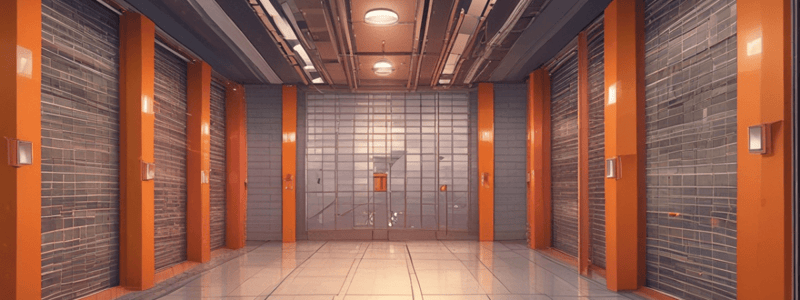Podcast
Questions and Answers
¿Cuál es el objetivo principal de la compartimentación de incendios en un edificio?
¿Cuál es el objetivo principal de la compartimentación de incendios en un edificio?
¿Qué tipo de materiales se utilizan para crear barreras contra incendios?
¿Qué tipo de materiales se utilizan para crear barreras contra incendios?
¿Cuál es la función de los materiales de parada de fuego en una barrera contra incendios?
¿Cuál es la función de los materiales de parada de fuego en una barrera contra incendios?
¿Qué requisito deben cumplir las puertas en una barrera contra incendios?
¿Qué requisito deben cumplir las puertas en una barrera contra incendios?
Signup and view all the answers
¿Por qué se utiliza la compartimentación de incendios en un edificio?
¿Por qué se utiliza la compartimentación de incendios en un edificio?
Signup and view all the answers
¿Qué norma regula las barreras contra incendios y la compartimentación de incendios?
¿Qué norma regula las barreras contra incendios y la compartimentación de incendios?
Signup and view all the answers
¿Cuál es el propósito principal de las barreras de humo?
¿Cuál es el propósito principal de las barreras de humo?
Signup and view all the answers
¿Cuál es el momento más efectivo para implementar la compartimentación de fuego en un edificio?
¿Cuál es el momento más efectivo para implementar la compartimentación de fuego en un edificio?
Signup and view all the answers
¿Qué documento contiene las regulaciones de seguridad contra incendios en Inglaterra?
¿Qué documento contiene las regulaciones de seguridad contra incendios en Inglaterra?
Signup and view all the answers
¿Cuál es el resultado de la implementación efectiva de la compartimentación de fuego?
¿Cuál es el resultado de la implementación efectiva de la compartimentación de fuego?
Signup and view all the answers
¿Qué es necesario para que un espacio se considere un compartimiento?
¿Qué es necesario para que un espacio se considere un compartimiento?
Signup and view all the answers
¿Cuál es el beneficio adicional de la compartimentación de fuego para los bomberos?
¿Cuál es el beneficio adicional de la compartimentación de fuego para los bomberos?
Signup and view all the answers
Study Notes
Fire Compartmentation: The Practice of Dividing a Building to Slow Down Fire and Smoke Spread
Fire compartmentation is a crucial aspect of passive fire protection, designed to slow down the spread of fire and smoke within a building. This form of fire protection is integral to the building's construction, working in tandem with active systems that detect and respond to fires.
Understanding Compartmentation
Compartmentation is defined in NFPA 101, Chapter 8, as the practice of dividing a structure into smaller subsections using fire-resistant materials, such as fire barriers and smoke barriers. The goal is to reduce the spread of fire and smoke, ensuring the safety of building occupants and assisting firefighters in containing and stopping a fire.
Types of Compartmentation
Fire compartmentation can be both fire-resistant and smoke-resistant, depending on the specific requirements of the building. For example, a library might compartmentalize its special collections room to protect valuable materials from both fire and smoke damage.
Fire Barriers
Fire barriers are a continuous membrane or a membrane with discontinuities, designed and constructed to limit the spread of fire. They are typically made of materials with a one-hour fire-resistance rating and must comply with the opening protective requirements of NFPA 101. Doors in fire barriers must also be self-closing with positive latching, and any penetrations must be sealed with approved fire-stop materials.
Smoke Barriers and Smoke Partitions
Smoke barriers are a continuous membrane or a membrane with discontinuities, designed and constructed to restrict the movement of smoke. They are similar in function to smoke partitions, but the terms are sometimes used interchangeably, leading to confusion.
Implementing Fire Compartmentation
Fire compartmentation is most effective when implemented during a building's construction. However, it can also be retrofitted into existing structures. To be considered a compartment, all materials used to construct the room or space must be fire-resistant.
Compartmentation Guidelines
In England, building fire safety regulations concerning fire compartmentation can be found in Approved Document B. These regulations include requirements for every floor of the building to be a compartment, every wall separating two separate businesses to be a compartment wall, and specifications for fire-resistance ratings.
Conclusion
Fire compartmentation is a vital aspect of passive fire protection, designed to slow down and contain the spread of fire and smoke within a building. It saves lives by providing additional time for people to evacuate and protects firefighters by making containing and stopping a fire easier. By incorporating fire barriers, smoke barriers, and other passive fire protection measures, buildings can be designed to resist the spread of fire and smoke, ultimately ensuring the safety of their occupants and protecting valuable assets.
Studying That Suits You
Use AI to generate personalized quizzes and flashcards to suit your learning preferences.
Description
Aprende sobre la importancia de la compartmentación de incendios en la protección pasiva contra incendios, cómo se utiliza para dividir un edificio en secciones más pequeñas y reducir la propagación del fuego y el humo. Descubre los diferentes tipos de compartmentación, barreras de fuego y particiones de humo, y cómo se implementan en la construcción de edificios.





